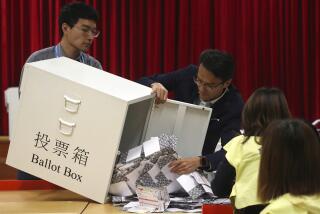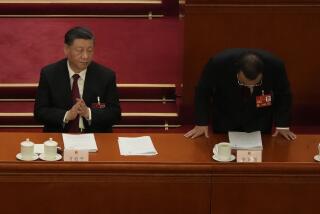Big China Shake-up Paves Way for Younger Leaders : Veterans of Revolution Step Down
- Share via
PEKING — The Chinese Communist Party approved today the most sweeping change in its top ranks in nearly a decade in a move that was said to be aimed at bringing younger party officials into senior leadership positions.
After a series of meetings at the Great Hall of the People here, the party’s Central Committee announced that 10 of the 25 members of the Politburo had submitted their resignations. In addition, 64 of the 346 full or alternate members of the Central Committee agreed to step aside.
Those losing their seats included some elderly figures who have played a prominent role in the Communist Party here since the Chinese civil war, such as Marshal Ye Jianying, 88, a powerful military leader, and Deng Yingchao, 81, the widow of Premier Chou Enlai.
The party changes appeared to indicate an upcoming shift in some important government positions as well. One of those who resigned from the Central Committee was Defense Minister Zhang Aiping, 75, who diplomats believe may soon give up the defense post.
Step Toward Rejuvenation
In a joint letter of resignation, those stepping aside explained that they wanted the party to “take a giant step towards rejuvenation.” They said they hoped that their action would ensure that “de facto lifelong tenure in leading posts will be abolished and a system of constant renewal of members of the leading organs (of the party) will be established.”
Their replacements will be named during a special conference of 1,000 leading Communist Party officials that will begin here on Wednesday. Analysts here cautioned that until the names of these replacements are made public, it will be impossible to gauge fully the impact of the changes.
But most said today that the resignations appeared to signal a far-reaching victory for Chinese leader Deng Xiaoping in his effort to install pragmatic young leaders who will perpetuate his campaign to modernize and reform the Chinese economy.
“I’d say it’s a major, unqualified success for Deng and the reformers at this stage,” one Western diplomat observed.
Reduction in Political Role
Some analysts also said they felt the list of resignations indicated a drastic reduction in the political role of the People’s Liberation Army, which has over the last decade served as a powerful conservative influence within the Communist Party.
Of the 10 Politburo members who resigned, six were military officials. “(The PLA) won’t be at the same strength after this,” one Asian diplomat said.
In 1982, on the eve of the last Communist Party congress, conservative PLA leaders mounted a serious challenge to Deng’s leadership, including an editorial in the military newspaper Liberation Army Daily openly questioning Deng’s effectiveness.
As a result, Deng was forced at that time to make so many compromises on personnel that a third of the new Politburo was composed of generals, and about a quarter of the Central Committee members were active-duty officers.
No Retirement Age Set
Despite the avowed commitment to bring in younger leaders, the Central Committee which approved the resignations today did not set any specific retirement age.
A number of older party leaders will stay in their posts, including Deng himself, who is 81, President Li Xiannian, 76, and senior economic expert Chen Yun, 80.
All three will remain on the Communist Party’s highest-ranking body, the Standing Committee of the Politburo, along with Deng’s two top proteges, Communist Party General Secretary Hu Yaobang, 69, and Premier Zhao Ziyang, 66.
The communique released by the Central Committee also announced a series of changes on two other important party organizations.
It said that 37 of the 162 members of the Communist Party’s Central Advisory Commission will step down and 30 of the 129 members of the Central Commission for Discipline Inspection will resign.
More to Read
Sign up for Essential California
The most important California stories and recommendations in your inbox every morning.
You may occasionally receive promotional content from the Los Angeles Times.










